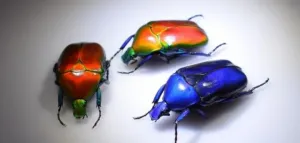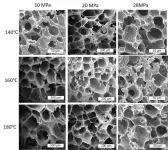Antibodies help identify women protected from placental malaria
Six antibody features help protect pregnant women against placental malaria infections, and could be used to identify women at risk of the disease and related complications
2021-06-29
(Press-News.org) Six antibody characteristics could help scientists identify which pregnant women are at risk of placental malaria infections, finds a study published today in eLife.
Malaria infections can be devastating for pregnant mothers, particularly during their first pregnancies. If malaria parasites invade the placenta, they can starve babies of nutrition, potentially causing low birth weight, preterm deliveries, stillbirths, and pregnancy loss. But not all women are susceptible to placental malaria infections, and the new study may help clinicians to identify those at risk and researchers to develop new therapies to protect pregnant women from malaria and related complications.
A protein made by malaria parasites called VAR2CSA allows them to attach to placental cells and invade the placenta. "Many women produce antibodies that can prevent this infection, and even those who have placental malaria during their first pregnancy are less likely to become infected during subsequent pregnancies because they have already developed protective antibodies," explains co-first author Dr Elizabeth Aitken, Research Officer at the Doherty Institute, University of Melbourne, Australia. "We set out to identify the features of these antibodies that help protect women from placental infections."
In their experiments, the research team used a machine learning technique to identify naturally acquired antibody features mid pregnancy that were associated with protection from placental malaria at delivery. They analysed 169 antibody features in 77 pregnant women from Madang, Papua New Guinea.
Of these features, they identified six that were associated with placental malaria protection. These fell into two broad groups: those related to preventing the parasites from binding to placental cells, and those that led to the destruction of infected blood cells. "Using these features, we created a model that could predict which pregnant women would develop placental malaria infections with 86% accuracy," says co-first author Timon Damelang, a PhD student at the Doherty Institute.
"These results suggest it is likely there are multiple pathways to protection against placental malaria," adds co-first author Amaya Ortga-Pajares, also a PhD student at the Doherty Institute.
"It will be interesting to learn whether this same combination of features can protect pregnant women from placental malaria infections in other populations," concludes senior author Professor Stephen Rogerson, Head of the Malaria Laboratory at the Doherty Institute, University of Melbourne. "This new insight is important for the development of novel vaccines or other treatments to protect pregnant women and their babies from the effects of malaria."
INFORMATION:
Media contacts
Emily Packer, Media Relations Manager
eLife
e.packer@elifesciences.org
+44 (0)1223 855373
Catherine Somerville, Senior Media and Communications Officer
The Peter Doherty Institute for Infection and Immunity (Doherty Institute)
catherine.somerville@unimelb.edu.au
+61 422 043 498
About eLife
eLife is a non-profit organisation created by funders and led by researchers. Our mission is to accelerate discovery by operating a platform for research communication that encourages and recognises the most responsible behaviours. We aim to publish work of the highest standards and importance in all areas of biology and medicine, including Immunology and Inflammation, while exploring creative new ways to improve how research is assessed and published. eLife receives financial support and strategic guidance from the Howard Hughes Medical Institute, the Knut and Alice Wallenberg Foundation, the Max Planck Society and Wellcome. Learn more at https://elifesciences.org/about.
To read the latest Immunology and Inflammation research published in eLife, visit https://elifesciences.org/subjects/immunology-inflammation.
About the Peter Doherty Institute for Infection and Immunity
Finding solutions to prevent, treat and cure infectious diseases and understanding the complexities of the immune system requires innovative approaches and concentrated effort. This is why The University of Melbourne - a world leader in education, teaching and research excellence - and The Royal Melbourne Hospital - an internationally renowned institution providing outstanding care, treatment and medical research - have partnered to create the Peter Doherty Institute for Infection and Immunity (Doherty Institute); a centre of excellence where leading scientists and clinicians collaborate to improve human health globally.
doherty.edu.au Facebook: DohertyInstitute Twitter: @TheDohertyInst #DohertyInstitute
ELSE PRESS RELEASES FROM THIS DATE:
2021-06-29
New insight on how our experiences during a task or interaction shape our current mood has been published today in the open-access eLife journal.
The study suggests that early experiences may have a larger effect on our mood than more recent events. These findings hold implications for the timing of events in experimental or clinical settings, and suggest new directions for mood interventions tailored to individual patients.
People routinely report on their moods during everyday activities and when they interact with clinicians providing mental health care. It is commonly believed ...
2021-06-29
Rising nighttime temperatures are curbing crop yields for rice, and new research moves us closer to understanding why. The study found that warmer nights alter the rice plant's biological schedule, with hundreds of genes being expressed earlier than usual, while hundreds of other genes are being expressed later than usual.
"Essentially, we found that warmer nights throw the rice plant's internal clock out of whack," says Colleen Doherty, an associate professor of biochemistry at North Carolina State University and corresponding author of a paper on the work.
"Most people think plants aren't dynamic, but they are. Plants are constantly regulating ...
2021-06-29
A recent proof-of-concept study finds that a low-cost training program can reduce hazardous driving in older adults. Researchers hope the finding will lead to the training becoming more widely available.
"On-road training and simulator training programs have been successful at reducing car accidents involving older drivers - with benefits lasting for years after the training," says Jing Yuan, first author of the study and a Ph.D. student at North Carolina State University. "However, many older adults are unlikely to have access to these training programs or technologies."
"We developed a training program, ...
2021-06-29
Populations of Drosophila suzukii fruit flies - so-called "spotted-wing Drosophila" that devastate soft-skinned fruit in North America, Europe and parts of South America - could be greatly suppressed with the introduction of genetically modified D. suzukii flies that produce only males after mating, according to new research from North Carolina State University.
D. suzukii are modified with a female-lethal gene that uses a common antibiotic as an off switch. Withholding the antibiotic tetracycline in the diet of larvae essentially eliminates birth of female D. suzukii flies as the modified male flies successfully mate with females, says Max Scott, an NC State entomologist who is the corresponding author of a paper describing the research.
"We use a genetic female-lethal system - a ...
2021-06-29
Researchers from the Laboratory of Oncolytic-Virus-Immuno-Therapeutics (LOVIT) at the LIH Department of Oncology (DONC) are working on the development of novel anticancer strategies based on oncolytic viruses, "good" viruses that can specifically infect, replicate in and kill cancer cells. In particular, the LOVIT team elucidated the mechanism through which the H-1PV cancer-destroying virus can attach to and enter cancer cells, thereby causing their lysis and death. At the heart of this process lie laminins, and specifically laminin γ1, a family of proteins on the surface of a cancer cell to which this virus binds, and which therefore act as the 'door' through which the virus enters the cells. The findings, which were published in the prestigious ...
2021-06-29
Beetles are creatures with built-in body armor. They are tiny tanks covered with hard shells, also known as exoskeletons, protecting their soft, skeleton-less bodies inside. In addition to providing armored protection, the beetle's exoskeleton offers functions like sensory feedback and hydration control. Notably, the exoskeletons of many beetles are also brilliantly colored and patterned, which enhances visual communication with other beetles and organisms.
Ling Li, lead investigator and assistant professor in mechanical engineering, has joined colleagues from six other universities to investigate the interplay between mechanical and optical performance ...
2021-06-29
Globally, more than 400 million people have diabetes, most of them suffering from type 2 diabetes.
Before the onset of actual type 2 diabetes, people are often diagnosed with abnormalities in glucose metabolism that are milder than those associated with diabetes. The term used to indicate such cases is prediabetes. Roughly 5-10% of people with prediabetes develop type 2 diabetes within a year-long follow-up.
Insulin resistance in muscle tissue is one of the earliest metabolic abnormalities detected in individuals who are developing type 2 diabetes, and the phenomenon is already seen in prediabetes.
In a collaborative study, researchers from the University of Helsinki, the ...
2021-06-29
URBANA, Ill. - Despite soybean's high protein and oil content and its potential to boost food security on the continent, Africa produces less than 1% of the world's soybean crop. Production lags, in part, because most soybean cultivars are bred for North and South American conditions that don't match African environments.
Researchers from the Soybean Innovation Lab (SIL), a U.S. Agency for International Development-funded project led by the University of Illinois, are working to change that. In a new study, published in Agronomy, they have developed methods to help breeders improve soybean cultivars specifically for African environments, with the intention of creating fast-maturing ...
2021-06-29
A new study highlights the University of Colorado Anschutz Medical Campus as an example of how an academic medical center can turn groundbreaking research into commercial products that improve patient care and public health.
The paper, published recently in the Journal of Clinical and Translational Science, focuses on the unique ecosystem at CU Anschutz responsible for these innovations. And it specifically details the campus's collaborative culture and how biomedical research is commercialized.
The campus has successfully turned academic research into a variety of products. CU Anschutz, for example, developed two vaccines for shingles, Zostavax and Shingrix, and ...
2021-06-29
WASHINGTON, June 29, 2021 -- Biodegradable plastics are supposed to be good for the environment. But because they are specifically made to degrade quickly, they cannot be recycled.
In Physics of Fluids, by AIP Publishing, researchers from the University of Canterbury in New Zealand have developed a method to turn biodegradable plastic knives, spoons, and forks into a foam that can be used as insulation in walls or in flotation devices.
The investigators placed the cutlery, which was previously thought to be "nonfoamable" plastic, into a chamber filled with carbon dioxide. ...
LAST 30 PRESS RELEASES:
[Press-News.org] Antibodies help identify women protected from placental malaria
Six antibody features help protect pregnant women against placental malaria infections, and could be used to identify women at risk of the disease and related complications




